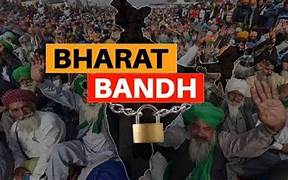
Bharat Bandh on July 9: Trade Unions Call Nationwide Strike Against Government Policies

 :
| Updated On: 08-Jul-2025 @ 12:08 pm
:
| Updated On: 08-Jul-2025 @ 12:08 pmSHARE
A forum of ten central trade unions and their affiliated organizations has called for a nationwide Bharat Bandh on Wednesday, July 9, in protest against what they describe as the government's "anti-worker, anti-farmer, and anti-national pro-corporate policies." The strike is expected to see participation from more than 25 crore workers across formal and informal sectors of the economy. In addition to industrial workers, farmers and rural workers will also join the protest, according to Amarjeet Kaur from the All India Trade Union Congress (AITUC).
The forum includes major trade unions such as AITUC, Indian National Trade Union Congress (INTUC), Hind Mazdoor Sabha (HMS), Centre of Indian Trade Unions (CITU), All India United Trade Union Centre (AIUTUC), Trade Union Coordination Centre (TUCC), Self Employed Women’s Association (SEWA), All India Central Council of Trade Unions (AICCTU), Labour Progressive Federation (LPF) and United Trade Union Congress (UTUC).
Union leaders announced on Monday that extensive preparations have been made for the bandh across sectors like banking, postal services, coal mining, factories, and state transport, which are likely to be disrupted due to the strike. Harbhajan Singh Sidhu from HMS confirmed the scale of the expected impact.
The trade union forum stated that it had submitted a 17-point charter of demands to Labour Minister Mansukh Mandaviya last year, but no significant action has been taken. One major grievance is that the government has not held the Indian Labour Conference for the past ten years. The unions claim the government is pushing forward with four new labour codes designed to weaken the power of unions, suppress collective bargaining, and favour employers under the guise of improving the "ease of doing business."
The forum further alleged that the current economic policies are worsening unemployment, raising the cost of essential goods, lowering wages, and reducing spending on essential public services like education, healthcare, and civic amenities. These, they argue, are increasing inequality and hardship for the poor, lower-income groups, and the middle class.
They accused the government of abandoning the concept of a welfare state and instead acting to serve the interests of foreign and Indian corporates, as evident in the aggressive push for privatisation, contractorisation, and casualisation of the workforce.
Addressing broader concerns, the forum criticized moves such as the Special Intensive Revision of electoral rolls in Bihar, calling it a potential ploy to disenfranchise migrant workers. They also cited the misuse of constitutional bodies to suppress dissent and condemned upcoming legislation in states like Maharashtra, Chhattisgarh, and Madhya Pradesh that aim to criminalize mass movements. The possibility of revoking citizenship rights was also flagged as a looming threat.
Support for the strike has been extended by the Samyukta Kisan Morcha (SKM) and a joint front of agricultural workers’ unions, who plan to mobilize large-scale protests across rural India.
This upcoming bandh follows previous nationwide general strikes held on November 26, 2020, March 28-29, 2022, and February 16, 2023, highlighting ongoing resistance to the government’s labour and economic policies.